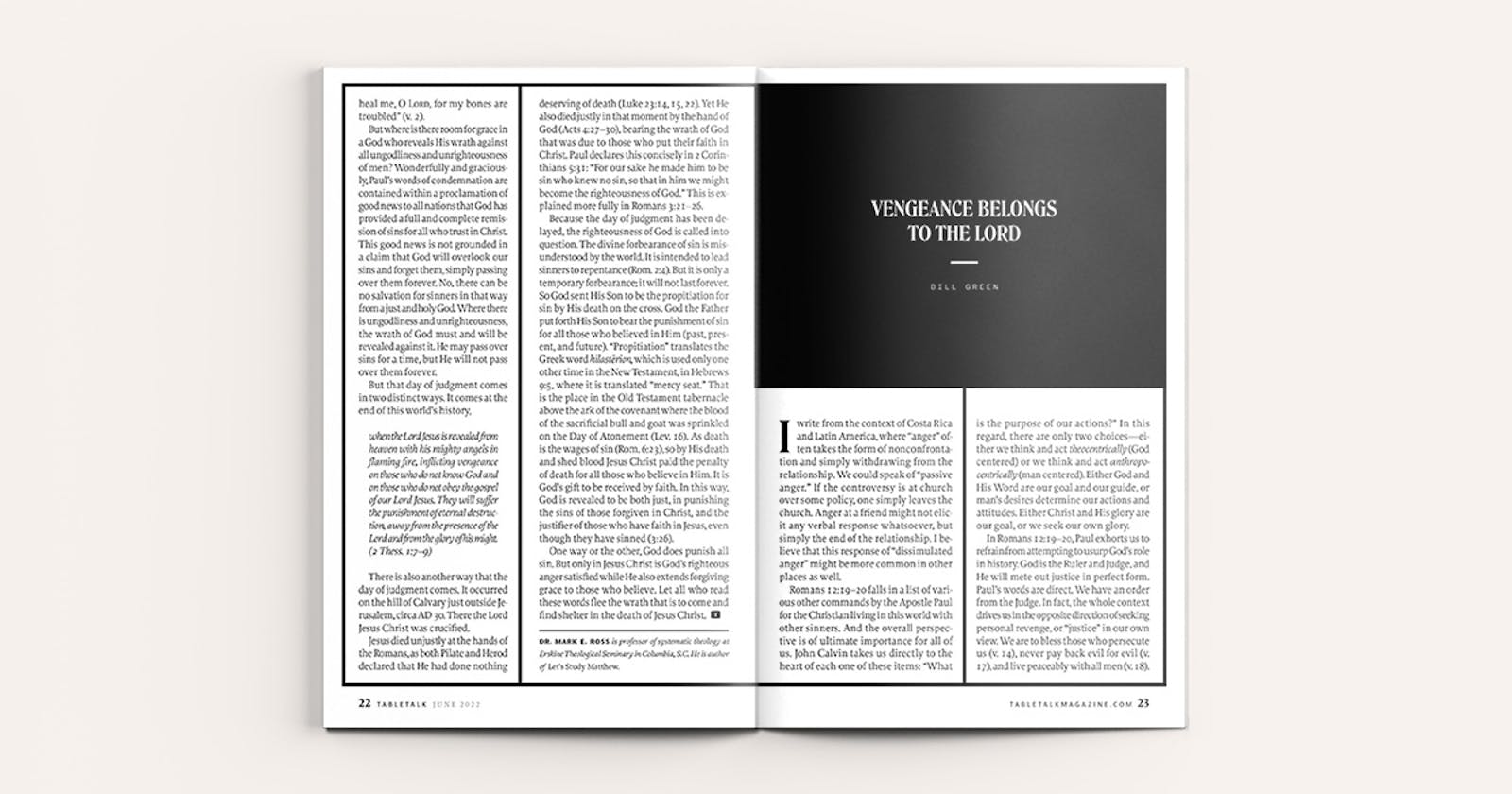
Request your free, three-month trial to Tabletalk magazine. You’ll receive the print issue monthly and gain immediate digital access to decades of archives. This trial is risk-free. No credit card required.
Try Tabletalk NowAlready receive Tabletalk magazine every month?
Verify your email address to gain unlimited access.
I write from the context of Costa Rica and Latin America, where “anger” often takes the form of nonconfrontation and simply withdrawing from the relationship. We could speak of “passive anger.” If the controversy is at church over some policy, one simply leaves the church. Anger at a friend might not elicit any verbal response whatsoever, but simply the end of the relationship. I believe that this response of “dissimulated anger” might be more common in other places as well.
Romans 12:19–20 falls in a list of various other commands by the Apostle Paul for the Christian living in this world with other sinners. And the overall perspective is of ultimate importance for all of us. John Calvin takes us directly to the heart of each one of these items: “What is the purpose of our actions?” In this regard, there are only two choices—either we think and act theocentrically (God centered) or we think and act anthropocentrically (man centered). Either God and His Word are our goal and our guide, or man’s desires determine our actions and attitudes. Either Christ and His glory are our goal, or we seek our own glory.
In Romans 12:19–20, Paul exhorts us to refrain from attempting to usurp God’s role in history. God is the Ruler and Judge, and He will mete out justice in perfect form. Paul’s words are direct. We have an order from the Judge. In fact, the whole context drives us in the opposite direction of seeking personal revenge, or “justice” in our own view. We are to bless those who persecute us (Rom. 12:14), never pay back evil for evil (Rom. 12:17), and live peaceably with all men (Rom. 12:18).
Paul quotes several Old Testament passages to show that God’s will has always been that men refrain from attempting to mete out God’s justice on earth in any personal form. God has given the magistrate a function to avenge injustice, but this is not personal vengeance. In our personal dealings, our attitude must be the opposite—to bless in the face of evil actions against us. We must make two observations about the interpretation of our text.
First, verse 19 does not contain the words “of God” in relation to wrath. The text simply says “leave room for wrath.” But William Hendriksen and others make an excellent case that we should definitely interpret this “wrath” as God’s wrath. God is the One in charge of “repaying” anything that must be repaid.
Second, how should we take “heap[ing] burning coals” on our enemies’ heads (Rom. 12:20)? Some interpret this as adding to their punishment on judgment day, or some other form of retribution. This interpretation, however, is completely contrary to the context, in which the Christian is aiming for good to come from his actions. The best interpretation agrees with what the Apostle Peter expresses in 1 Peter 2:15: “For this is the will of God, that by doing good you should put to silence the ignorance of foolish people.” The generous deeds of Christians in the face of ill will toward them have the goal of bringing embarrassment and shame on the evildoer.

When seen in the broader context of Paul’s epistle of Romans, this passage helps the Christian understand that each one of us deserves God’s wrath because of our sin. Only God’s grace in Christ has brought us deliverance. The Christian can never desire that wrath come on another human being on account of a personal grievance. To do so would be to betray a misunderstanding of God’s grace toward us in Christ. We leave to God’s perfect justice and wisdom the final end of each individual, and simply live gratefully in God’s grace to us in Christ.
Returning to the matter of “passive anger,” we can see that our Christian response should be a positive one in the face of passive resentment. Often when we sense this “latent anger,” the tendency is for us to withdraw as well. “Be gone, then!” is our common response. Biblically, it should be just the opposite. Our goodwill expressed in concrete terms should be so sincere that the angry partner should feel shame at leaving or breaking the relationship. This is often not easy, for we usually feel betrayed. In the context of “passive anger,” however, our passage pushes us firmly in the direction of “active love.”
